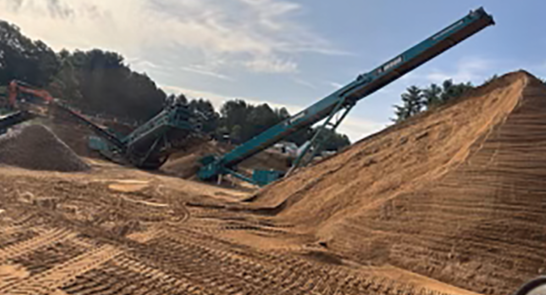GEORGETOWN ‒ Last week, at an untelevised joint meeting with the SelectBoard, Georgetown Town Manager Orlando Pacheco told the town’s Board of Assessors that the controversial 214 North Street farm is in the process of being sold.
Pacheco said the property would most likely be under agreement for sale to an unnamed developer “by December first. She’s going to sell the property, the whole property.”
The 100-year-old farm has 28 acres, five of which were recently being mined for its sand. The plan was to mine other 5-acre parcels for the valuable sand.
Town hall sources confirmed that the future developer has met with the planning, conservation and other offices investigating the property, reviewing maps, asking about utilities, water, and determining any offsets and any limitations on placing an untold number of homes/townhouses/apartments on the parcel.
Pacheco stated the developer was looking at adjacent property too to allow proper access to the property for a large development.
The farm’s sand mining has filled pages of this newspaper and other publications this year, following its extensive, unpermitted open-pit sand mining operation in a residential neighborhood. A spokesperson for the owner said he was allowed to mine the sand as part of an organic farming operation. Mining stopped shortly after he hit the water table at 19 feet.
“Nineteen feet? I would have dug down 191 feet if I could have,” to mine the sand and sell it off to concrete plants and others, contractor Todd Champlain told The Town
Common.
Contracted by the farm’s current owner, Kathy Potter who inherited the land when her father Pete Zibell died, Champlain had his excavation and screening machines shut down in late August by a court order.
According to neighbors who attended the joint meeting of the SelectBoard and Assessors, the dumping and burial of construction, highway, and other debris has gone on unmonitored for years.
Board of Assessors Chairman Thomas Berube said that “five acres of formerly productive crop land, converted to a sand and gravel quarry ‒which is a change of use ‒ triggered certain actions.” He went on to detail the tax subsidies that the former farm owner enjoyed under Mass. Law 61A which taxed the land at a fraction of what a residential property would be taxed.
“Basically, the taxpayers in town have been subsidizing this farm,” by shouldering the burden of taxes it would otherwise be subjected to, Berube said.
Berube detailed how the conversion to industrial use led to the rollback of taxes, subjecting the farm to approximately $12,000 in extra taxes. He detailed that the assessors have to follow the law on usage, and apply taxes appropriately. They do not get involved in other issues.
More than one neighbor expressed shock that the farm owner could sell off more than $1 million in sand and gravel, moving trucks on and off the property every five minutes and face only a minor tax bill.
At its Selectboard meeting last week, Pacheco told the SelecBoard they had just 30 days to decide to purchase the property, and that he would never recommend purchasing 5 acres of land-locked property. However, both his stated timeline and number of acres were not technically accurate.
“One of the things that I picked up on watching the portion of the selectmen’s meeting from the 6th, when they were discussing this, is I think they were under the impression that they only had 30 days to get an appraisal and exercise this option,” Berube said.
He said the town has 30 days to receive requested documentation from the landowner, followed by 120 days to make a decision to purchase. Then it has a 90-day window to execute the purchase. In all, the process could allow the town approximately six months to purchase the property if it wants to.
Pacheco said there has been an on-going, private discussion to resolve the legal issues that the Board brought against the property. He further detailed that the agreement that is before them now “would be a restoration” of the property to its prior big-dig condition.
Neighbors blasted the town for allowing the open-pit mining operation adjacent to their homes, saying “restoration has to be more than filling the pit: They’ve been dumping there for years.”
Several neighbors said they took photos of asphalt being dumped and buried, and filed photos with the town. One resident said the property owners were using almost the entire property to support the mining operation. “It’s a shame that for months, bells were going off, and the town did nothing. You had trucks backed up at 5:30 in the morning, lined up, nothing.”
Another neighbor said. “These people, they burned us, they burned us badly. We look like fools. Organic farming? Come on.”
“I wouldn’t eat a thing that touched that soil,” another neighbor of the former farm said. “We’re looking at what? A future environmental cleanup? And they get off the hook with a settlement?”
Planning Board Chair Harry LaCortiglia suggested that perhaps the land could become part of the Essex County Green Belt and not be developed.
“Historically, Harry – and no disrespect to the conservation in town – but the track record for maintaining conservation land is worse than the Cleveland Browns Super Bowl wins,” Pacheco replied. [Note: The Cleveland Browns have never won a Super Bowl.]
“Our goal is not to make sure there is no development, but to make sure that it is properly sized,” Pacheco said. ♦




